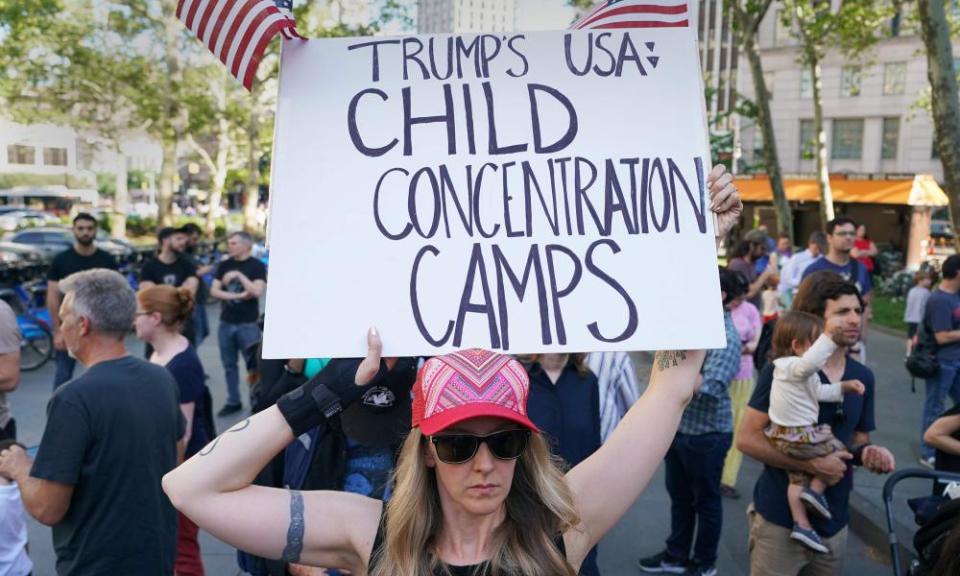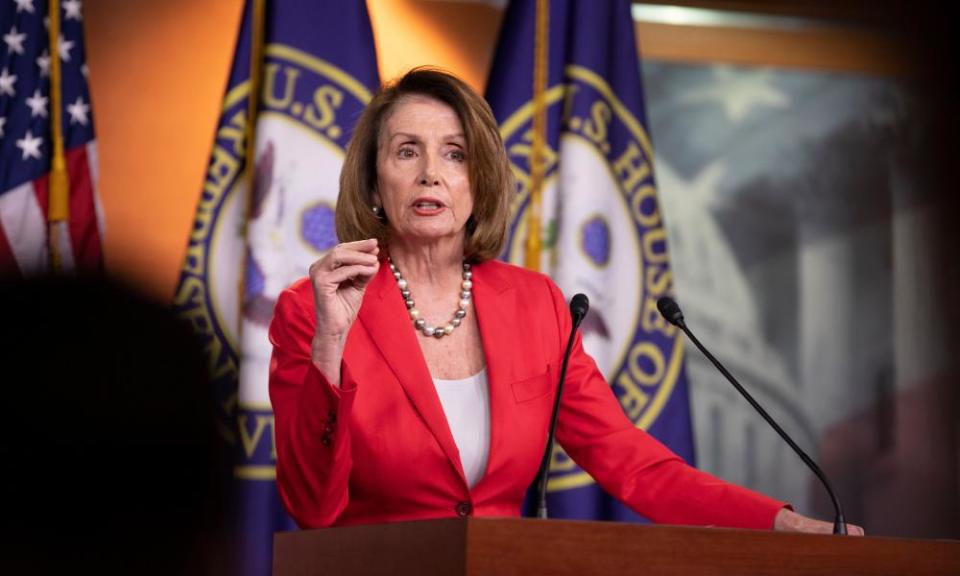Republicans consider immigration plan that would end family separation
Proposal comes as US plans temporary facility to house the growing number of children separated at the border

Republicans members of Congress are considering legislation to end family separations at the border as the US plans to open a temporary facility to accommodate the growing number of immigrant children separated from their parents.
The policy was outlined in a “discussion draft” of an immigration proposal that aims to find common ground between rival factions of the House Republican party by pairing relief for young undocumented immigrants with billions of dollars in funding for Donald Trump’s wall along the southern border.
Why are children being separated from their families?
In April 2018, the US attorney general, Jeff Sessions, announced a “zero tolerance” policy under which anyone who crossed the border without legal status would be prosecuted by the justice department. This includes some, but not all, asylum seekers. Because children can’t be held in adult detention facilities, they are being separated from their parents.
Immigrant advocacy groups, however, say hundreds of families have been separated since at least July 2017.
More than 200 child welfare groups, including the American Academy of Pediatrics and the United Nations, said they opposed the practice.
What happens to the children?
They are supposed to enter the system for processing “unaccompanied alien children”, which exists primarily to serve children who voluntarily arrive at the border on their own. Unaccompanied alien children are placed in health department custody within 72 hours of being apprehended by border agents. They then wait in shelters for weeks or months at a time as the government searches for parents, relatives or family friends to place them with in the US.
This already overstretched system has been thrown into chaos by the new influx of children.
Can these children be reunited with their parents?
Immigration advocacy groups and attorneys have warned that there is not a clear system in place to reunite families. In one case, attorneys in Texas said they had been given a phone number to help parents locate their children, but it ended up being the number for an immigration enforcement tip line.
On the other side, advocates for children have said they do not know how to find parents, who are more likely to have important information about why the family is fleeing its home country. And if, for instance, a parent is deported, there is no clear way for them to ensure their child is deported with them.
What happened to families before?
When an influx of families and unaccompanied children fleeing Central America arrived at the border in 2014, Barack Obama’s administration detained families.
This was harshly criticized and a federal court in 2015 stopped the government from holding families for months without explanation. Instead, they were released while they waited for their immigration cases to be heard in court. Not everyone shows up for those court dates, leading the Trump administration to condemn what it calls a “catch and release” program.
The plan comes as weeks of negotiations over a path forward on immigration coincided with painful stories about children being separated from their parents at the US-Mexico border, the result of the administration’s “zero-tolerance” approach to immigration enforcement.
The controversial practice of forcibly separating families has led to widespread condemnation from human rights groups, religious leaders and lawmakers.
“We don’t want kids to be separated from their parents,” the House speaker, Paul Ryan, told reporters during a weekly press conference, echoing the sentiments expressed by several members of his own party. He called on Congress to find a legislative solution.
Republicans’ “discussion draft” would keep families united by clarifying a 1997 court ruling that prevents undocumented children from being held in custody for long periods – in addition to providing protections for young undocumented immigrants, funding for a border wall and restrictions on legal immigration.
The proposal comes as the US government intends to construct a temporary shelter in Tornillo, Texas, to accommodate the overflow of unaccompanied children as a result of the Trump administration policy, according to the Associated Press.
A spokesman for the US Department of Health and Human Services told the AP that the facility would have “soft-sided structures”, but did not clarify whether the children would be housed in “tents”.
Democrats have railed against the policy. Senator Jeff Merkley, a Democrat from Oregon, drew attention to the issue after he was denied entry to a federal detention center housing unaccompanied minors earlier this month. On Wednesday, eight House Democrats, including the veteran civil rights leader John Lewis, linked arms and blocked traffic in protest of the Trump administration policy.
Nancy Pelosi, the House Democratic leader, called the policy “barbaric” and said “this is not what America is”.
“This is the policy of the Trump administration. And they put down this practice and they take it back,” she told reporters on Thursday, adding: “What is it that they don’t get about how stupid and wrong and immoral [this is]?”
Trump has repeatedly eschewed responsibility for his own administration’s policy, blaming the separations on a “horrible law” passed by Democrats. There is no such law that requires the government to separate children from their parents.
The increasing number of families being separated at the border is largely the result of the Trump administration’s “zero tolerance” enforcement policy in which immigrants entering the US illegally would be referred for criminal prosecution.
Previously, the administration would allow children to remain with their parents by releasing families while they awaited civil deportation proceedings. Now the administration is choosing to release the children to relatives or foster care.

On Thursday, the White House press secretary, Sarah Sanders, cited the bible to defend the administration’s hardline approach to border enforcement.
“I can say that it is very biblical to enforce the law. That is actually repeated a number of times throughout the Bible,” she told reporters during the press briefing. “It’s a moral policy to follow and enforce the law.”
Jeff Sessions, the attorney general, had earlier on Thursday referenced a passage from the Bible to defend the administration’s border policy.
The public criticism of the administration’s immigration policy disrupted negotiations between House Republicans this week. House Republican leadership narrowly avoided a showdown over immigration after moderate members attempted to force a vote on legislation that would provide protections for young undocumented immigrants, known as Dreamers.
To avert the rebellion, Ryan pledged to allow votes next week on two immigration bills: a plan billed as a compromise between factions of the Republican party and a more conservative proposal backed by the conservative bloc. Their fates remain uncertain as Republicans try to marshall support while Democrats signaled that they are unlikely to back either legislation.
Asked if the White House supported either plan, Sanders refused to answer directly.
“The president’s already laid out a proposal that closes the legal loopholes and provides the resources to secure our border,” she said. “If the process leads to a permanent solution, as outlined by the president, then we would support it.”

